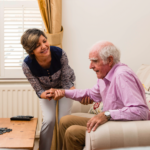What Qualifications And Training Do I Need To Be A Live-In Carer?
Whether you are looking for employment in the health and care field, or you are looking for someone to provide live-in care to one of your relatives, it’s important to know what kind of requirements there are and what qualifications a person needs to have to become a live-in carer.
In the first case, it will help you understand what steps you need to take to be closer to becoming a live-in carer, and in the second, it will help you make more knowledgeable decisions when hiring one.
In this article, we will go through qualifications one needs to have if they want to pursue a career as a live-in carer, be it for the elderly or those who have some kind of disability or illness preventing them from being able to live on their own (for example those with advanced dementia or mobility issues). So, let’s just get started.
What Are the Legal Requirements for Being a Live-In Carer?
The short and simple answer is that there aren’t any – the statutory law doesn’t say anything about live-in carer qualifications. However, if you wish to find a job with an agency that provides live-in care, especially for the elderly, you will need to complete a training composed of four modules – Moving and Handling, First Aid, Safeguarding of Vulnerable Adults, and Medication.
Let’s break down all the modules:
- Moving and Handling – this is to teach the carer how to move and support clients with mobility issues so that they can reach their destination without any of the parties getting injured.
- First Aid – pretty self-explanatory, but this module provides the carers with training and knowledge on what to do in various emergencies to take care of their clients before the paramedics come.
- Safeguarding of Vulnerable Adults – this module consists of learning about and putting into practice the means that guarantee that the life of vulnerable adults is free of neglect and abuse, as well as creating a risk-free environment.
- Medication – this teaches the carers how to provide their clients with medicine correctly. The topics covered during this part of the training include the basic rules of medical administration – the right medication, right dose, right patient, right time, right route, right reason, right response, and right documentation.
Many live-in care providers also offer additional training, including, for example, health and safety, effective communication, end-of-life care, dementia care, and so on.
Also, while sometimes a high school diploma is enough to pursue a career as a live-in carer, in order to be a licensed carer, you will need to acquire a Care Certificate. To put it simply, the Care Certificate is a set of standards that those working in the health and care field need to adhere to on a daily basis.
While, as we already mentioned, statutory law doesn’t recognize it as a requirement, the CQC (the Care Quality Commission), which is an independent regulator of the health and care services in the United Kingdom, does expect you to have it in case:
- you are new in the health and care department
- you are employed as an adult social care worker
- you provide direct care in facilities such as nursing homes, residential homes, hospices, and so on.
In many cases, the Care Certificate is part of the training provided by the live-in care provider. However, if you are not employed by one and have no experience when it comes to live-in care, acquiring it might be the best choice.
It also goes without saying that the more qualified you are (meaning, the more training you have), the more likely you are to find a job in a nice facility that puts focus on providing its clients with the best possible care.
The Bottom Line
Live-in carers have many responsibilities on their shoulders, as they need to make sure that their client is as best taken care of as possible – one of the ways to do it is by getting the necessary training. On the other hand, the person searching for a live-in carer for their loved ones needs to know what to look for when looking to hire one. In both cases, it is important to know what kind of requirements there are for live-in carers – which is exactly what you’ve learned from this article.


